- Home
- Robert Harris
Enigma Page 12
Enigma Read online
Page 12
For their fourth date (the fifth, if you count their meeting on the train) she insists they do something different, so they go to the County Cinema on the High Street to see the new Noël Coward picture, In Which We Serve.
‘And you really mean to tell me you’ve never once been here?’
They’re queuing for tickets. The film’s only been showing for a day and the line extends round the corner into Aylesbury Street.
‘I haven’t, actually, to be honest, no.’
‘God, Tom, you are a funny old darling. I think I’d die stuck in Bletchley without the flicks to go to.’
They sit near the back and she laces her arm through his. The light from the projector high up behind them makes a kaleidoscope of blues and greys in the dust and cigarette smoke. The couple next to them are kissing. A woman giggles. A fanfare of trumpets announces a newsreel and there, on the screen, long columns of German prisoners, an impossible number, are shown trekking through snow, while the announcer talks excitedly about Red Army breakthroughs on the eastern front. Stalin appears, presenting medals, to loud applause. Someone shouts: ‘Three cheers for Uncle Joe!’ The lights come up, then dim again, and Claire squeezes his arm. The main film begins – ‘This is the story of a ship’ – with Coward as an improbably suave Royal Navy captain. There’s a lot of clipped excitement. ‘Vessel on fire bearing green three-oh … Torpedo track, starboard, sir … Carry on firing …’ At the climax of the sea battle, Jericho looks around at the flickering of the celluloid explosions on the rapt faces, and it strikes him that he is a part of all this – a distant, vital part – and that nobody knows, nobody will ever know … After the final credits the loudspeakers play ‘God Save the King’ and they all stand, many of the audience so moved by the film they begin to sing.
They’ve left their bicycles near the end of an alley running beside the cinema. A few paces further on a shape rubs itself against the wall. As they come closer they can see it is a soldier with his greatcoat wrapped around a girl. Her back is to the bricks. Her white face stares at them from the shadows like an animal in its hide. The movement stops for the time it takes Claire and Jericho to collect their bicycles, then it starts again.
‘What very peculiar behaviour.’
He says it without thinking. To his surprise, Claire bursts out laughing.
‘What’s the matter?’
‘Nothing,’ she says.
They stand on the pavement holding their bicycles, waiting for an Army lorry with dimmed headlights to pass, its gearbox grinding as it heads north along Watling Street. Her laughter stops.
‘Do come and see my cottage, Tom.’ She says it almost plaintively. ‘It’s not that late. I’d love to show it you.’
He can’t think of an excuse, doesn’t want to think of one.
She leads the way through the town and out past the Park. They don’t speak for fifteen minutes and he begins to wonder how far she’s taking him. At last, when they’re rattling down the path that leads to the cottage, she calls over her shoulder, ‘Isn’t it a perfect sweetheart?’
‘It’s, ah, off the beaten track.’
‘Now don’t be horrible,’ she says, pretending to be hurt.
She tells him how she found it standing derelict, how she charmed the farmer who owns it into letting her rent it. Inside, the furniture is shabby-grand, rescued from an aunt’s house in Kensington that was shut up for the Blitz and never reopened.
The staircase creaks so alarmingly, Jericho wonders if their combined weight might pull it away from the wall. The place is a ruin, freezing cold. ‘And this is where I sleep,’ she says, and he follows her into a room of pinks and creams, crammed full of pre-war silks and furs and feathers, like a large dressing-up box. A loose floorboard goes off like a gunshot beneath his feet. There’s too much detail for the eye to register, so many hat boxes, shoe boxes, bits of jewellery, cosmetic bottles … She slips off her coat and lets it fall to the floor and flings herself flat out on the bed, then props herself up on her elbows and kicks off her shoes. She seems amused by something.
‘And what’s this?’ Jericho, in a turmoil, has retreated to the landing and is staring at the only other door.
‘Oh, that’s Hester’s room,’ she calls.
‘Hester?’
‘Some bureaucratic beast found out where I was and said if I had a second bedroom I had to share. So in came Hester. She works in Hut 6. She’s a sweetie, really. Got a bit of a crush on me. Take a look. She won’t mind.’
He knocks, there’s no reply, he opens the door. Another tiny room, but this one spartan, like a cell: a brass bedstead, a jug and bowl on a washstand, some books piled on a chair. Ableman’s German Primer. He opens it. ‘Der Rhein ist etwas langer als die Elbe,’ he reads. The Rhine is somewhat longer than the Elbe. He hears the gunshot of the floorboard behind him and Claire lifts the book from his hands.
‘Don’t snoop, darling. It’s rude. Come on, let’s make a fire and have a drink.’
Downstairs, he kneels by the hearth and rolls a copy of The Times into a ball. He piles on kindling and a couple of small logs, and lights the paper. The chimney draws voraciously, sucking up the smoke with a roar.
‘Look at you, you haven’t even taken off your coat.’
He stands, brushing the dust away, and turns to face her. Grey skirt, navy cashmere sweater, a single loop of milk-white pearls at her creamy throat – the ubiquitous, unchanging uniform of the upper-class Englishwoman. She somehow contrives to look both very young and very mature at the same time.
‘Come here. Let me do it.’
She sets down the drinks and begins to unbutton his overcoat.
‘Don’t tell me, Tom,’ she whispers, ‘don’t tell me you didn’t know what they were doing behind that cinema?’
Even barefoot she is as tall as he is.
‘Of course I knew …’
‘In London nowadays the girls all call it a “wall job”. What do you think? They say you can’t get pregnant this way …’
Instinctively, he draws his coat around her. She wraps her arms about his back.
3
Damn it, damn it, damn it.
He pitched himself forwards and out of the chair, sending the images scattering and smashing on the cold stone floor. He prowled around the tiny sitting room a couple of times, then went into the kitchen. Everything was clean and swept and put away. That would be Hester’s handiwork, he guessed, not Claire’s. The stove had burned down very low and was lukewarm to the touch, but he resisted the temptation to shovel in some coal. It was quarter to one. Where was she? He wandered back into the sitting room, hesitated at the foot of the stairs, and began to climb. The plaster on the walls was damp and flaking beneath his fingers. He decided to try Hester’s room first. It was exactly as it had been six weeks earlier. A pair of sensible shoes beside the bed. A cupboard full of dark clothes. The same German primer. ‘An seinen Ufern sind Berge, Felsen und malerische Schlosser aus den ältesten Zeiten.’ On its shores are mountains, rocks and picturesque castles from the oldest times. He closed it and went back out on the landing.
And so, at last, to Claire’s room.
He was quite clear now about what he was going to do, even though conscience told him it was wrong and logic told him it was stupid. And, in principle, he agreed. Like any good boy he had learned his Aesop, knew that ‘listeners never hear good of themselves’ – but since when, he thought, as he began opening drawers, since when has that pious wisdom stopped anybody? A letter, a diary, a message – anything that might tell him why – he had to see it, he had to, even though the chances of its yielding any comfort were nil. Where was she? Was she with another man? Was she doing what all the girls in London, darling, call a wall job?
He was suddenly in a rage and he went through her room like a housebreaker, pulling out drawers and upending them, sweeping jewellery and trinkets off the shelves, pulling her clothes down on to the floor, throwing off her sheets and blankets and wrenching up her mattress,
raising clouds of dust and scent and ostrich feathers.
After ten minutes he crawled into the corner and laid his head on a pile of silks and furs.
‘You’re a wreck,’ Skynner had said. ‘You’re ruined. You’ve lost it. Find someone more suitable than the person you were seeing.’
Skynner knew about her, and Logie had seemed to know as well. What was it he’d called her? The ‘arctic blonde’? Perhaps they all knew? Puck, Atwood, Baxter, everybody?
He had to get out, get away from the smell of her perfume and the sight of her clothes.
And it was that action that changed everything, for it was only when he stood on the landing, leaning with his back to the wall and his eyes closed, that he realised there was something he’d missed.
He walked back slowly and deliberately into her room. Silence. He stepped across the threshold and repeated the action. Silence again. He got down on his knees. One of auntie’s Kensington rugs covered the floorboards, something oriental, stained, and tastefully threadbare. It was only about two yards square. He rolled it up and laid it on the bed. The wooden planks which had lain beneath it were bowed with age, worn smooth, fixed down by rust-coloured nails, untouched for two centuries – except in one place, where a shorter length of the old planking, perhaps, eighteen inches long, was secured by four very modern, very shiny screws. He slapped the floor in triumph.
‘Is there any other point to which you would wish to draw my attention, Mr Jericho?’
‘To the curious incident of the creaking floorboard.’
‘But the floorboard didn’t creak.’
‘That was the curious incident.’
In the mess of her bedroom he could see no suitable tool. He went down into the kitchen and found a knife. It had a mother-of-pearl handle with an ‘R’ engraved on it. Perfect. He almost skipped across the sitting room. The tip of the knife slotted into the head of the screw and the thread turned easily, it came away like a dream. So did the other three. The floorboard lifted up to reveal the horsehair and plaster of the downstairs ceiling. The cavity was about six inches deep. He took off his overcoat and his jacket and rolled up his sleeve. He lay on his side and thrust his hand into the space. To begin with he brought out nothing except handfuls of debris, mostly lumps of old plaster and small pieces of brick, but he kept on working his way around until at last he gave a cry of delight as his hand touched paper.
He put everything back in its place, more or less. He hung the clothes back up from the beams, piled her underclothes and her scarves back into the drawers and replaced the drawers in the mahogany chest. He heaped the trinkets of jewellery into their leather case and draped others artfully along the shelves, together with her bottles and pots and packets, most of which were empty.
He did all this mechanically, an automaton.
He remade the bed, lifting off the rug and smoothing down the eiderdown, throwing the lace cover over it where it settled like a net. Then he sat on the edge of the mattress and surveyed the room. Not bad. Of course, once she began looking for things, then she would know someone had been through it, but at a casual glance it looked the same as before – apart, that is, from the hole in the floor. He didn’t know yet what to do about that. It depended on whether or not he replaced the intercepts. He pulled them out from under the bed and examined them again.
There were four, on standard-size sheets, eight inches by ten. He held one up to the light. It was cheap wartime paper, the sort Bletchley used by the ton. He could practically see a petrified forest in its coarse yellow weave – the shadows of foliage and leaf-stalks, the faint outlines of bark and fern.
In the top left-hand corner of each signal was the frequency on which it had been transmitted – 12260 kilocycles per second – and in the top right its TOI, Time of Interception. The four had been sent in rapid succession on 4 March, just nine days earlier, at roughly twenty-five-minute intervals, beginning at 9.30 p.m. and ending just before midnight. Each consisted of a call sign – ADU – and then about two hundred five-letter groups. That in itself was an important clue. It meant, whatever else they were, they weren’t naval: the Kriesgmarine’s signals were transmitted in groups of four letters. So they were presumably German Army or Luftwaffe.
She must have stolen them from Hut 3.
The enormity of the implications hit Jericho for a second time, winding him like a punch in the stomach. He arranged the intercepts in sequence on her pillow and tried very hard, like a defending King’s Counsel, to come up with some innocent explanation. A piece of silly mischief? It was possible. She had certainly never paid much attention to security – shouting about Hut 8 in the station buffet, demanding to know what he did, trying to tell him what she did. A dare? Again, possible. She was capable of anything. But that hole in the floorboards, the cool deliberation of it, drew his gaze and mocked his advocacy.
A sound, a footstep downstairs, dragged him out of his reverie and made him jump to his feet.
He said, ‘Hello?’ in a loud voice that suggested more courage than he felt. He cleared his throat. ‘Hello?’ he repeated. And then he heard another noise, definitely a footstep, and definitely outside now, and a charge of adrenaline snapped in. He moved quickly to the bedroom door and turned the light off, so that the only illumination in the cottage came from the sitting room. Now, if anyone came up the stairs, he would be able to see their silhouette, while remaining hidden. But nothing happened. Perhaps they were trying to come round the back? He felt horribly vulnerable. He moved cautiously down the stairs, flinching at every creak. A blast of cold air struck him.
The front door was wide open.
He threw himself down the last half-dozen steps and ran outside, just in time to see the red rear light of a bicycle shoot out of the track and vanish down the lane.
He set off in pursuit but gave up after twenty paces. He didn’t stand a chance of catching the cyclist.
There was a heavy frost. In every direction the ground shone a dull and luminous blue. The branches of the bare trees were raised against the sky like blood vessels. In the glittering ice, two sets of tyre-tracks were imprinted: incoming and outgoing. He followed them back to the door, where they ended in a series of sharp footprints.
Sharp, large, male footprints.
Jericho looked at them for half a minute, shivering in his shirtsleeves. An owl shrieked in the nearby copse and it seemed to him that its call had the rhythm of Morse: dee-dee-dee-dah, dee-dee-dee-dah.
He hurried back into the cottage.
Upstairs, he rolled the intercepts very tightly into a cylinder. He used his teeth to tear a small hole in the lining of his overcoat and pushed the signals into it. Then he quickly screwed down the floorboards and replaced the rug. He put on his jacket and coat, turned off the lights, locked the door, replaced the key.
His bicycle added a third set of impressions in the frost.
At the entrance to the lane he stopped and looked back at the darkened cottage. He had a strong sensation – foolish, he told himself – that he was being watched. He glanced around. A gust of wind stirred in the trees; in the blackthorn hedge beside him, icicles clinked and chimed.
Jericho shivered again, remounted the bike and pointed it down the hill, towards the south, towards Orion and Procyon, and to Hydra, which hung suspended in the night sky above Bletchley Park like a knife.
FOUR
KISS
KISS: the coincidence of two different cryptograms, each transmitted in a different cipher, yet each containing the same original plaintext, the solution of one thereby leading to the solution of the other.
A Lexicon of Cryptography
(‘Most Secret’, Bletchley Park, 1943)
1
HE DOESN’T KNOW what wakes him – some faint sound, some movement in the air that hooks him in the depths of his dreams and hauls him to the surface.
At first his darkened room seems entirely normal – the familiar jet-black spar of the low oak beam, the smooth grey plains of wall and ceiling
– but then he realises that a faint light is rising from the foot of his bed.
‘Claire?’ he says, propping himself up. ‘Darling?’
‘It’s all right, darling. Go on back to sleep.’
‘What on earth are you doing?’
‘I’m just going through your things.’
‘You’re … what?’
His hand fumbles across the bedside table and switches on the lamp. His Waralarm shows him it is half past three.
‘That’s better,’ she says, and she turns off the blackout torch. ‘Useless thing, anyway.’
And she is doing exactly what she says. She is naked except for his shirt, she is kneeling, and she is going through his wallet. She removes a couple of one-pound notes, turns the wallet inside out and shakes it.
‘No photographs?’ she says.
‘You haven’t given me one yet.’
‘Tom Jericho,’ she smiles, replacing the money, ‘I do declare, you’re becoming almost smooth.’
She checks the pockets of his jacket, his trousers, then shuffles on her knees across to his chest of drawers. He laces his hands behind his head and leans back against the iron bedstead and watches her. It is only the second time they have slept together – a week after the first – and at her insistence they have done it not in her cottage but in his room, creeping through the darkened bar of the White Hart Inn and up the creaking stair. Jericho’s bedroom is well away from the rest of the household so there is no danger of them being overheard. His books are lined up on the top of the chest of drawers and she picks up each in turn, holds it upside down and flicks through the pages.
Does he see anything odd in all this? No, he does not. It merely seems amusing, flattering, even – one further intimacy, a continuation of all the rest, a part of the waking dream his life has become, governed by dream rules. Besides, he has no secrets from her – or, at least, he thinks he hasn’t. She finds Turing’s paper and studies it closely.

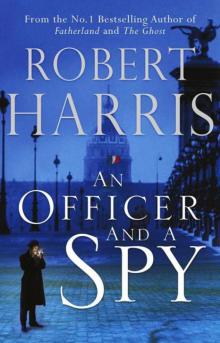 An Officer and a Spy
An Officer and a Spy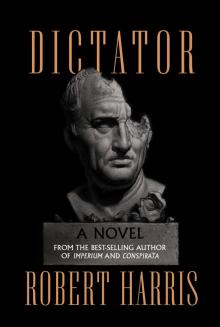 Dictator
Dictator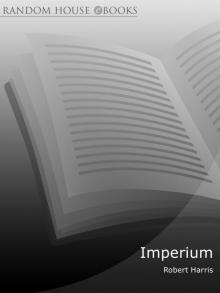 Imperium:
Imperium: Enigma
Enigma Fatherland
Fatherland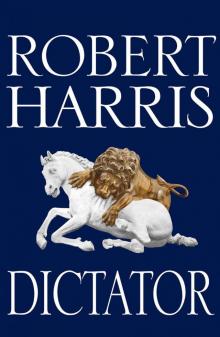 Dictator:
Dictator: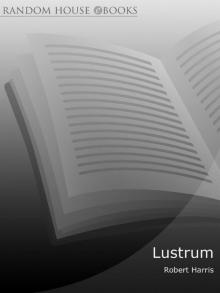 Lustrum
Lustrum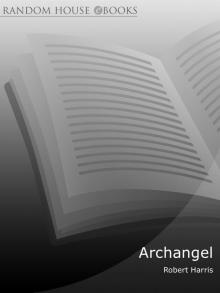 Archangel
Archangel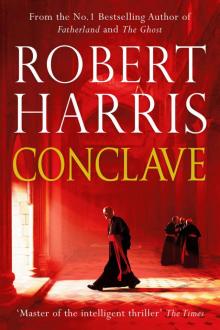 Conclave
Conclave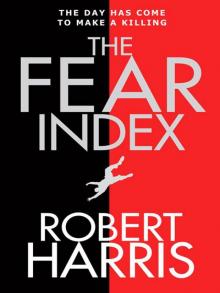 The Fear Index
The Fear Index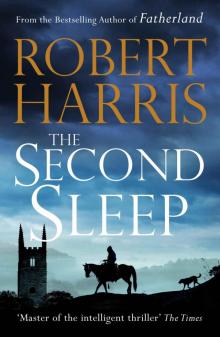 The Second Sleep
The Second Sleep V2
V2 Lustrum c-2
Lustrum c-2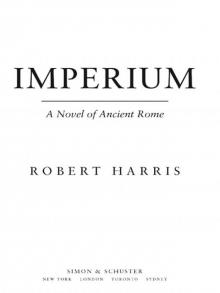 Imperium
Imperium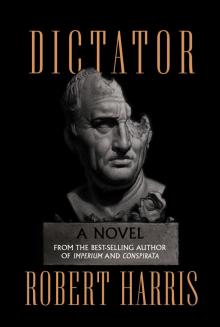 The Dictator
The Dictator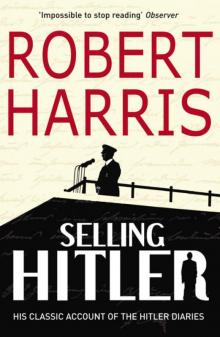 Selling Hitler
Selling Hitler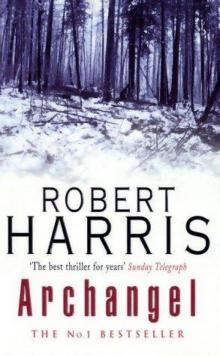 Archangel (Mass Market Paperback)
Archangel (Mass Market Paperback)